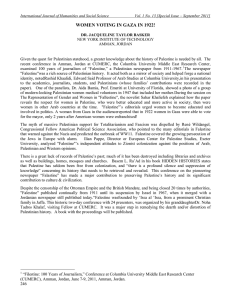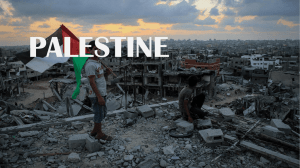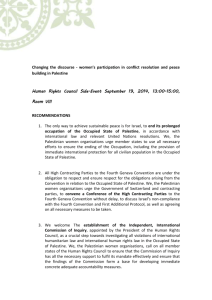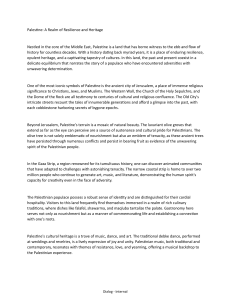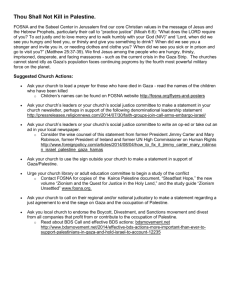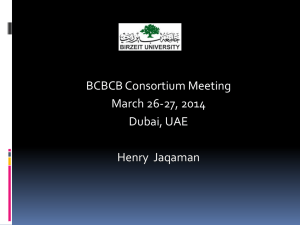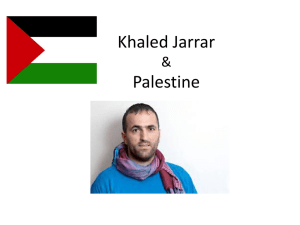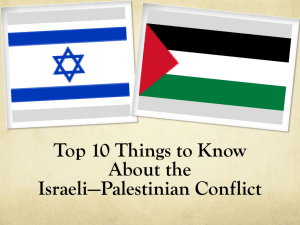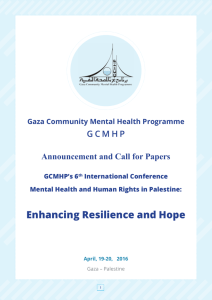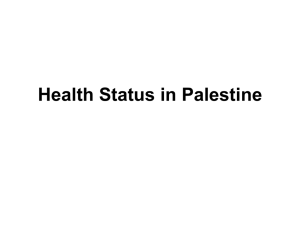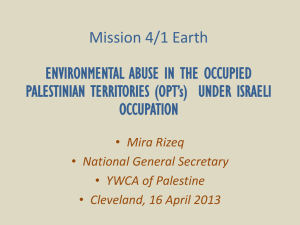Juzoor for Health and Social Development
advertisement
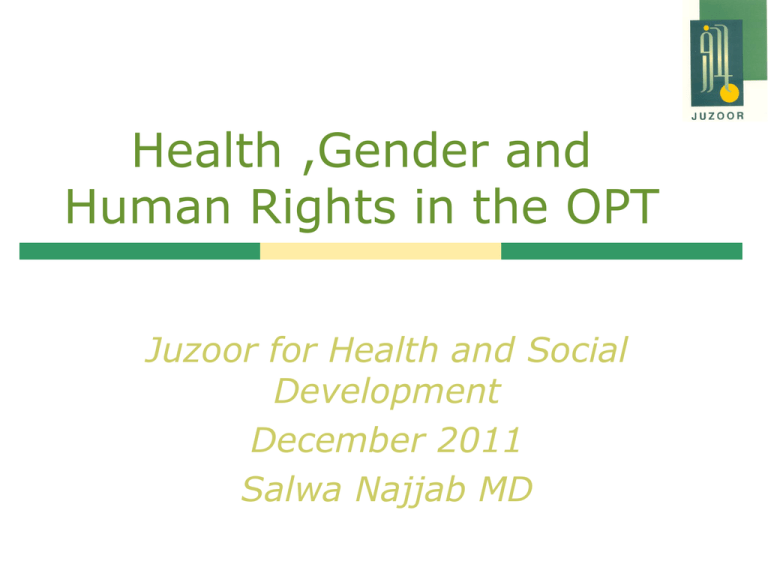
Health ,Gender and Human Rights in the OPT Juzoor for Health and Social Development December 2011 Salwa Najjab MD OCCUPATION 60 years of continuous war 40 years of Israeli military occupation Occupied Palestinian Territory (oPt) West Bank, Gaza have been under Israeli occupation since 1967. Territorial fragmentation of the West Bank and complete isolation of the Gaza Strip and Jerusalem-since 2000 Gates to villages Juzoor For Health & Social Development جذور لإلنماء الصحي واالجتماعي Checkpoint to Jerusalem Birth and Death at Checkpoints Since 2001, UNFPA recorded more than 70 cases of women in labor who were delayed at checkpoints which resulted in unattended births, causing maternal and newborn deaths Land Confiscation Over 100 Settlements-500,500 Settlers Violation of international law Daily violation of Human Rights and Dignity Challenges in Palestine Factors impacting women's health Gender inequality Limited decision making Poverty power Political conflict Selected Health Indicators in Palestine Indicators (PCBS) West Bank Gaza Palestine Population (2011) 2,580,167 1,588,791 4,168,858 21 % 45.7% 65.8% 4.1 5.2 4.6 Life expectancy - - M 70.5-F 73 Maternal Mortality rate per 100,000 - - 60 - 70 Proportion of children below the age of 15 41% 48% Refugee 28% 68% Poverty Total Fertility Rate Early Marriage 1 Improving Maternal Health to Achieve the Millennium Development Goals in the Eastern Mediterranean Region : A Youth Lens. One third of girls marry before age 18 6% become mothers TWICE as likely to die while giving birth Under 15 FIVE more times likely to die in childbirth1 Infant Mortality Rate Infant mortality is 27.6/1000; 67% occur within the early neonatal period . (Palestinian Health Survey 2006). UNFPA assessment after the war 40% increase in miscarriage cases 50% increase in neonatal deaths Home births increased from 5% to 35% Increase in c/s from 15% to 32% Increase in premature delivery Shifa hospital Rapid Epidemiological Transition Burden of NCDs greater on women Early Pregnancy, Short Birth Intervals; unmet needs for FP; Epidemic of Psychosocial Disorders; Gender Based Violence Morbidity among men and women in their 50s 35 Prevalence (%) 30 25 20 Females 15 Males 10 5 0 Diabetes Hypertension Cardiac diseases Women are particularly vulnerable to the improper functioning of the following public services Health Education Justice Challenges of the Health System Fragmented and inconsistent MoH, UNRWA, NGOs and Private Sector High migration of skilled professionals Biomedical approach to health Women's Health services in Palestine Limited training opportunities Continuous lowering of quality of care Poor Skills of health providers No systematic inquiry process Inadequate Health System Lack of evidence based protocols Affects Women’s Health status Lack of supervision Health Care Providers Health Providers in the oPt PCBC-2006 5566 6000 5000 4355 3590 4000 3000 2000 970 823 466 1000 63 0 0 GP Specialists Females Midwives Males Nurses Health Policy Environment •Weak role of professional bodies and regulatory frameworks. •Incomplete and inadequate licensing and accreditation systems. •Weak policy making and implementation. Health Financing Dependency on donor aid Weak budget planning and fiscal management systems Lack of a Monitoring and Evaluation (M&E) Framework Low percentage of PNA budget spent on health It is time to ask ourselves What can we do to change? -notWhat happened? Juzoor for Health and Social Development Palestinian NGO established in 1996 working at the national level towards “A Healthier Palestine, where all Palestinians achieve the highest standard of well-being” Juzoor’s Approach Views Health from a rights perspective . Adheres to principles of Equity. Answers the Continuous Health Education needs Looks at the emergency needs with a developmental perspective Addresses social determinants of health Juzoor Strategic Areas: Empowering Communities Continuous Professional Development Impacting Health and Social Policies Empowering Communities… Empowering Marginalized Groups Enhancing Women & Youth’s health economic security through social protection. Continuous Professional Development Facilitate dialogue among different health care levels Standardize the skills of health care providers Enhance the interactions between health service provides Improve access to High Quality Care Mental Health in PHC ALSO cont. OB Cases West Bank Gaza Workstations Short Courses ALSO NRP PALS BLS ACLS Infection Prevention and Control Normal Childbirth Impacting Health and Social Policy Contribute to the national level policy dialogue Building Palestinian Middle East alliances with Health Policy Health Policy policy making Forum Forum organizations Safety in women's health care HEALTH ETHICS WOMENS’ HEALTH RIGHTS SAFETY POLICIES AND MEASURES Thank You
